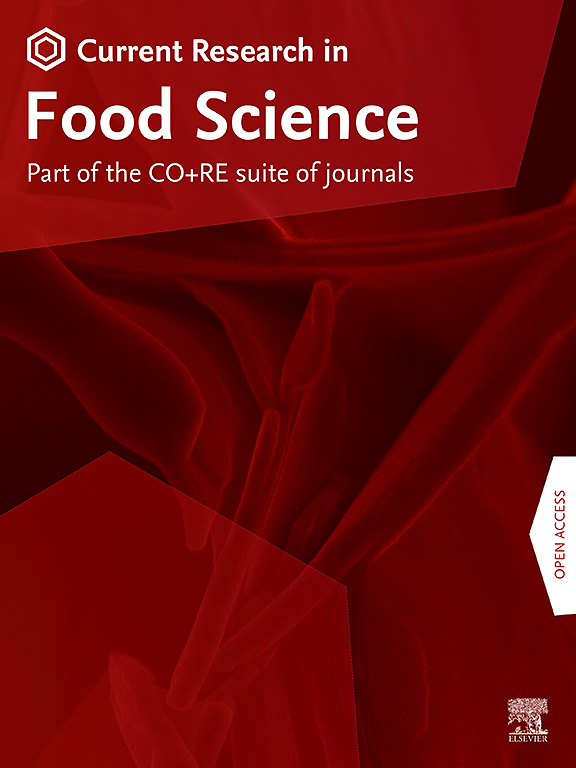Genistein improves depression-like behavior in rats by regulating intestinal flora and altering glutamate gene expression
IF 6.2
2区 农林科学
Q1 FOOD SCIENCE & TECHNOLOGY
引用次数: 0
Abstract
Depression is a mental disorder, and genistein is known to have antidepressant effects, but its mechanism of action is still unclear. Here, the mechanism of genistein improving depression based on gut microbiota was explored using classic behavioral indicators of depression combined with genomic technology. The behavioral evaluation showed that rats gavaged with 20–40 mg/kg genistein showed an increase in body weight, glucose preference, absenteeism score, body temperature, and 5-hydroxytryptamine (5-HT) content, while a decrease in adrenocorticotropic hormone (ACTH) and corticosterone (CORT) content compared to the depression rat model group, but there was no significant difference compared to the positive control (fluoxetine). The results of high-throughput sequencing showed that genistein increased the relative abundance of Firmicutes and Actinobacteriota and decreased the relative abundance of Bacteroidota at the phylum level. At the genus level, the abundance of Bifidobacterium, a short-chain fatty acid producing bacterium, was increased. Furthermore, metagenome results revealed that the antidepressant effect of genistein can be achieved by promoting glutamate metabolism, increasing glutamic acid decarboxylase (GAD) expression levels, promoting γ-aminobutyric acid (GABA) synthesis, and indirectly increasing 5-HT levels.

染料木素通过调节肠道菌群和改变谷氨酸基因表达改善大鼠抑郁样行为
抑郁症是一种精神疾病,染料木素已知有抗抑郁作用,但其作用机制尚不清楚。本研究利用经典的抑郁症行为指标,结合基因组技术,探讨染料木黄酮基于肠道微生物群改善抑郁症的机制。行为学评价结果显示,20 ~ 40 mg/kg金木黄酮灌胃大鼠体重、葡萄糖偏好、旷课评分、体温、5-羟色胺(5-HT)含量均较抑郁大鼠模型组增加,促肾上腺皮质激素(ACTH)和皮质酮(CORT)含量降低,但与阳性对照氟西汀相比差异无统计学意义。高通量测序结果显示,染料木素在门水平上增加了厚壁菌门和放线菌门的相对丰度,降低了拟杆菌门的相对丰度。在属水平上,双歧杆菌(一种短链脂肪酸产生细菌)的丰度增加。此外,宏基因组结果显示染料木素的抗抑郁作用可能通过促进谷氨酸代谢、增加谷氨酸脱羧酶(GAD)表达水平、促进γ-氨基丁酸(GABA)合成以及间接增加5-羟色胺水平来实现。
本文章由计算机程序翻译,如有差异,请以英文原文为准。
求助全文
约1分钟内获得全文
求助全文
来源期刊

Current Research in Food Science
Agricultural and Biological Sciences-Food Science
CiteScore
7.40
自引率
3.20%
发文量
232
审稿时长
84 days
期刊介绍:
Current Research in Food Science is an international peer-reviewed journal dedicated to advancing the breadth of knowledge in the field of food science. It serves as a platform for publishing original research articles and short communications that encompass a wide array of topics, including food chemistry, physics, microbiology, nutrition, nutraceuticals, process and package engineering, materials science, food sustainability, and food security. By covering these diverse areas, the journal aims to provide a comprehensive source of the latest scientific findings and technological advancements that are shaping the future of the food industry. The journal's scope is designed to address the multidisciplinary nature of food science, reflecting its commitment to promoting innovation and ensuring the safety and quality of the food supply.
 求助内容:
求助内容: 应助结果提醒方式:
应助结果提醒方式:


